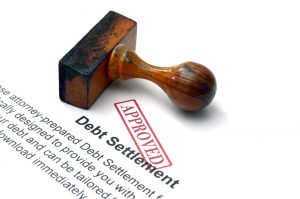If you have a large amount of credit card debt, your first move may be to file bankruptcy.A� Bankruptcy is a quick fix; it is meant for people who need the burden of debt lifted from their shoulders immediately, but also comes paired with consequences that may affect your credit score, and thus your purchasing potential, for years to come.A� Although bankruptcy may be the best move in your situation, there are a few other options to consider before taking the plunge.
Credit Card Debt Relief:
Interest Rate Negotiation

The first option to consider when it comes to debt relief is to negotiate your current interest rate with your credit card company.A� If you have credit card debt, you are likely paying a grossly inflated interest rate each month, since credit card companies are infamous for hiking up rates with any delinquent payments.A� Lowering your monthly interest rates can reduce the burden of debt, and may possibly save you from filing bankruptcy.A� When you are negotiating with credit companies directly, the most important consideration is your credit score.A� If you do not have a long history of delinquent payments, your credit score may still be good enough to pursue this option. A�However, for most who are seeking debt relief, the very nature of their situation usually implies that they have less than an adequate credit score.A� Thus, the option to negotiate is generally an idealistic notion for someone attempting to ward off bankruptcy.A� Yet, there are no downsides to trying, so if you believe negotiation is a possibility, give your credit company a call!
Debt Consolidation Loan
A debt consolidation loan involves moving high interest credit card debt to a low interest account through a loan.A� This loan could either be secured or unsecured, which is the distinction between the loan being and not being backed by collateral, such as a house or car.A� Generally, secured loans allow for a lower interest rate, since the banks know they have that collateral in case of delinquency.A� To qualify for a debt consolidation loan, you again must have a good credit score, but not to the same level needed to negotiate with the credit card companies.A� That is because a debt consolidation loan is less objectively beneficial than an interest rate negotiation; there is more of a balance of positive and negative with a debt consolidation loan.
While successfully negotiating a lower interest rate with your credit card company is in all cases a positive, acquiring a debt consolidation loan could be good or bad depending on the situation.A� Although a debt consolidation loan will lower your monthly interest rate, effectively lowering your monthly burden, it in many cases requires longer to pay off.A� For instance, if you were paying 15 percent interest on 30,000 dollars worth of debt, and the debt consolidation company tells you they can lower your rate to 10 percent interest, it may sound good.A� Yet, most loans require a fixed monthly payment, set for a certain number of years.A� By making the monthly payment lower by lowering the interest, the overall payment may look lower, but you may be paying more in the long run by paying that reduced rate for longer.A� A debt consolidation loan is definitely a good option for people who simply need their monthly payments lowered to reduce the burden of debt.A� For most, though, a debt consolidation loan means paying the debt consolidation company exorbitant fees instead of the credit card company, and does not fix the root problem.A� Instead, those in debt should focus on changing their spending habits, and not on searching for temporary alleviation.
Home Equity Loan
 One form of a debt consolidation loan is a home equity loan, which involves using your home loan essentially as collateral to reduce your credit card interest rate.A� This works because your home loan is a secured loan, and thus adds asset to your unsecured credit card debt.A� A vast majority of experts on the subject agree that a home equity loan should not be used to alleviate credit card debt.A� Although it could effectively reduce interest payments, it invites the risk of the bank seizing your home.A� Because overspending on credit cards is such an entrenched cultural problem, to gamble your home on unsecured credit card debt is something which should only in very specific circumstances be employed.
One form of a debt consolidation loan is a home equity loan, which involves using your home loan essentially as collateral to reduce your credit card interest rate.A� This works because your home loan is a secured loan, and thus adds asset to your unsecured credit card debt.A� A vast majority of experts on the subject agree that a home equity loan should not be used to alleviate credit card debt.A� Although it could effectively reduce interest payments, it invites the risk of the bank seizing your home.A� Because overspending on credit cards is such an entrenched cultural problem, to gamble your home on unsecured credit card debt is something which should only in very specific circumstances be employed.
Credit Transfer
Another option to consider when attempting to lower your interest rate is a credit transfer.A� A credit transfer involves moving your credit card debt from one card to another with lower interest.A� In many cases, you may transfer multiple cards and even non credit card debt onto a single card, making monthly payments more convenient.A� However, just like the debt consolidation loan, there are other aspects to consider.A� For instance, a credit transfer will nearly always cost a fee.A� Often, that is a percentage from the amount you are transferring, making the balance between this fee and the interest you would be saving a consideration.
Also, when deciding whether to conduct a credit transfer, you should determine the length of the interest rate.A� Often, when transferring to a card with a low interest rate, that rate is a temporary a�?teaser rate,a�? meant to entice those who want immediate interest rate relief.A� However, once the teaser rate expires, the interest rate may shoot above the initial interest rate you were attempting to escape.A� Thus, if you have debt which will have to be paid over a long period, you must understand the long term rates of the card, and not just the shiny, low initial rate.
Moreover, the low interest rate they initially offer may only apply to payments on debt transferred.A� New debt accumulated may be charged with a far higher rate; higher, perhaps, than the interest rate on the original card.A� If you believe your root problem of overspending has not been cured, a credit transfer may not be a good choice.A� Also, it must be stated that just like the prior two options, a good credit score is generally a prerequisite to be considered for a credit transfer. A�Click on the following link for information concerning coping with debt.
Debt Management Program
 A Debt Management Program is often a good midway option between the prior options and filing for bankruptcy.A� By signing up for a debt management plan, a person in debt will receive budgeting help and education for the future, while consolidating their payments to a single monthly fee paid to the debt management counselor.A� This counselor will be an intermediary between you and the credit card companies, hopefully creating a workable monthly budget.A� In most cases, the mere act of signing up for a debt management program will increase your credit score over the long run, even if it initially drops due to the cancellation of lines of credit.A� By actively educating yourself for the future and hopefully making more regular payments, your credit score will eventually rise to a respectable level.
A Debt Management Program is often a good midway option between the prior options and filing for bankruptcy.A� By signing up for a debt management plan, a person in debt will receive budgeting help and education for the future, while consolidating their payments to a single monthly fee paid to the debt management counselor.A� This counselor will be an intermediary between you and the credit card companies, hopefully creating a workable monthly budget.A� In most cases, the mere act of signing up for a debt management program will increase your credit score over the long run, even if it initially drops due to the cancellation of lines of credit.A� By actively educating yourself for the future and hopefully making more regular payments, your credit score will eventually rise to a respectable level.
However, there are also negatives to joining a debt management program.A� For one, joining is similar to bankruptcy in the sense that you must close all credit cards and lines of credit.A� You also cannot seek new lines of credit while in the program.A� Although this could be perceived as a benefit for someone who is financially irresponsible with credit cards, it is still a limit on freedom.A� Because it is heavily subsidized by the government, debt management programs are generally not very expensive, and in Arizona, free debt counseling exists around the state for those in less dire circumstances.
Debt Settlement
If the above options fail, and you are still hesitant to declare bankruptcy, you may consider attempting to settle your debt.A� Debt settlement is generally attempted only when someone simply cannot pay back their debt in full, since it has such a negative affect on credit score.A� Debt settlement can be achieved through a standard debt settlement or a consumer proposal.
A standard debt settlement involves contacting a debt settlement company, a task which should be matched with appropriate research.A� Debt settlement scams are common, as are companies who care more about profit than helping their clients.A�
The following is a list of things to watch out for, taken from the Arizona Attorney General:
 –Debt settlement companies selling their services by telephone cannot charge or collect a fee before they settle or reduce your debt.
–Debt settlement companies selling their services by telephone cannot charge or collect a fee before they settle or reduce your debt.
-Be sure to obtain a copy of and thoroughly review the debt settlement companya��s terms, fees, and policies.
-If you set up an account to deposit funds for possible settlement and fees, make sure the account is administered by an independent third party.
-Debt settlement companies are required to tell you how many months or years it will be before making an offer to each creditor, and they must tell you how much money you need to pay into escrow before they will make an offer to each creditor.
-Beware any debt settlement program that touts a a�?new government programa�? to bail out personal credit card debt, or promises that you will only pay a�?pennies on the dollar.a�?
-Beware any guarantees that the company will a�?make your unsecured debt go awaya�? or a�?stop all debt collection calls and lawsuits.a�?
Assuming you have found a reputable company, there are still other factors to consider.A� Debt settlement is predicated on the credit card companies’ fear that they will never be paid back on the debt you owe.A� Debt settlement companies will negotiate with credit card companies by exploiting this fear and reducing the debt owed.A� Although this often results in a lower amount of debt, it requires you to pay monthly fees directly to the settlement company.A� If you have not done sufficient budgetary research and these monthly fees become overwhelming, the fallout may be even more disastrous than before.A� Also, because you are not paying the credit card companies directly, a risk becomes guaranteeing the contract between the settlement company and the credit card companies.A� If you are paying the settlement company based on their word, and they have not been honest, the credit card companies may begin requesting direct payment, tacking on late fees and even seizing assets like cars and homes.A� This again highlights the importance of ensuring the settlement company is reputable.
Another option for debt settlement is a consumer proposal.A� This option does not require you to hire a company to settle, but instead allows you to negotiate with the credit card companies yourself.A� To successfully settle your debt, you must convince a majority of your creditors to agree to the new number.A� Once a majority have agreed, all other creditors are forced to agree, pursuant to the Bankruptcy and Insolvency Act.A� In some cases, using a consumer proposal is more damaging to your credit score than hiring a settlement company.A� Although your credit score will likely drop by hiring a settlement company, filing a consumer proposal automatically designates your credit score as R7, which means it is a revolving account.A� R7 allows a credit limit, likely very low, but the number 7 shows creditors that you needed to settle your account.A� This is innately negative, showing that you were unable to manage your finances.A� It must also be mentioned that any debt settlement is only approved after creditors have proven that you have explored all other debt relief options.A� Often, options like debt resettlement are last-ditch options, reserved for people who are truly incapable of managing their debt.A� Without proof of other attempts, it is unlikely that your debt resettlement bid will be approved.
Interested in learning more about debt relief options in the state of Arizona?A� We’d love to hear from you!A� Comment below or reach out to us on our social media channels.A� If you need legal help regarding bankruptcy or other debt relief alternatives, contact an experienced Phoenix defense attorney today.




